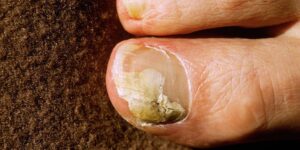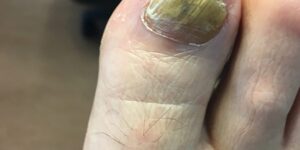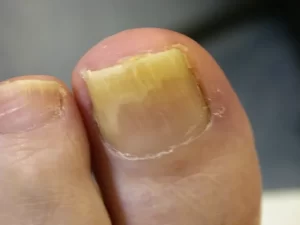Please do not be embarrassed about your feet. I enjoy my work and get great satisfaction with the results I deliver
At The Hub New Mills we offer a range of treatments to suit personal lifestyle and severity of the fungal nail infection. Treatments start from £20.00.
5 Minute Fungal Nail Test
Have you got Fungal nail? or do you have damaged, thickened, discoloured nails?
At The Hub we now offer a quick pain free Highley accurate, fungal nail test with results available 10 minutes from taking samples/nail cuttings test Scientifically proven to give highly accurate and reliable results
Benefits of the test
Detects the presence of all common fungus types from the smallest sample of nail
No need to send your nail clippings to the NHS laboratory No long waiting time for results, which may take 4 or more weeks via NHS
No long waiting time for results, which may take 4 or more weeks via NHS
Immediate diagnosis, allowing us to initiate treatment without delay.
Rapid Results in just a few minutes, whilst you wait., This simple and effective Five Minute Fungal Nail Test is transforming the way foot healthcare professionals diagnose dermatophyte (fungal) nail infections.
The Five Minute Nail Fungus Test has been shown to have an accuracy of 97% in published studies– meaning you can be confident in the test results.
The test confirms the presence of dermatophytes and thus fungal nail infection in a small nail sample by a process known as immune-chromatography. If the test is negative, then fungal nail infection is not present which mean the deformity is most likely due to other nail pathologies
The cost of the 5-min fungal nail test will be £45.00
The price includes taking the nail sample, performing the test, and confirming the results.
Immediate diagnosis, allowing to treat accordingly and without delay. You will be able to take the results to your GP who will then be able to start oral treatment (if deemed appropriate) immediately
Causes
Nail fungal infections are typically caused by a dermatophyte fungus. Yeasts and and moulds can also be responsible for nail fungal infections.
What are fungi?
- Fungi are microscopic organisms that don’t need sunlight to survive. Some fungi have beneficial uses. Others cause illness and infection.
- Fungi live in warm, moist environments, including swimming pools and showers.
Fungi can invade your skin through cuts so tiny you can’t even see them or through a small separation between your nail and nail bed. This can cause problems if your nails are often exposed to warm and moist conditions. - Nail fungus occurs more often in toenails than in fingernails, partly because toenails are often confined in a dark, warm, moist environment — inside your shoes — where fungi can thrive. Toes usually have less blood flow than do fingers, making it harder for your body’s immune system to detect and stop infection.
Risk factors
- Factors that can increase your risk of developing nail fungus include; being older, owing to reduced blood flow, more years of exposure to fungi and slower growing nails.
- Perspiring heavily. Being male, especially if you have a family history of nail fungal infections, working in a humid or moist environment or in a job where your hands are often wet, such as bartending or housekeeping.
- Wearing socks and shoes that hinder ventilation and don’t absorb perspiration.
- Living with someone who has nail fungus.
- Walking barefoot in damp communal areas, such as swimming pools, gyms and shower rooms.
- Having athlete’s foot.
- Having a minor skin or nail injury or a skin condition, such as psoriasis.
- Having diabetes, circulation problems, a weakened immune system or, in children, Downs syndrome.
Complications
- A severe case of nail fungus can be painful and may cause permanent damage to your nails. And it may lead to other serious infections that spread beyond your feet if you have a suppressed immune system due to medication, diabetes or other conditions.
- If you have diabetes, you may have reduced blood circulation and nerve supply in your feet. You’re also at greater risk of a bacterial skin infection (cellulitis). So any relatively minor injury to your feet — including a nail fungal infection — can lead to a more serious complication. See your doctor if you have diabetes and think you’re developing nail fungus.
- If you have athlete’s foot as well as nail fungus, treat the athlete’s foot with appropriate creams or sprays and if needed oral medication prescribed bt your GP and keep your feet clean and dry.
Prevention
These habits can help prevent nail fungus or reinfections:
- Wash your hands and feet regularly and keep your nails short and dry. Wash your hands and feet with soap and water, rinse, and dry thoroughly, including between the toes. Trim nails straight across and file down thickened areas.
- Wear socks that absorb sweat. Change your socks often, especially if you have sweaty feet.
- Choose shoes that reduce humidity. It also helps to occasionally take off your shoes or wear open-toe footwear.
- Discard old shoes. If possible, avoid wearing old shoes, which can harbor fungi and cause a reinfection. Or treat them with disinfectants or antifungal powders.
- Use an antifungal spray or powder. Spray or sprinkle your feet and the insides of your shoes.
- Wear rubber gloves. This protects your hands from overexposure to water. Between uses, turn the gloves inside out to dry.
- Don’t trim or pick at the skin around your nails. This may give germs access to your skin and nails.
- Don’t go barefoot in public places. Wear sandals or shoes around pools, showers, and locker rooms.
- Choose a reputable nail salon. Make sure the place you go for a manicure or pedicure sterilizes its instruments.
- Give up nail polish and artificial nails. Although it may be tempting to hide nail fungal infections under a coat of pretty pink polish, this can trap unwanted moisture and worsen the infection.
- Wash your hands after touching an infected nail. Nail fungus can spread from nail to nail.


